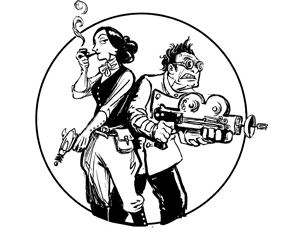Today, we tip our hats to another steampunk inspiration, Lady Ada King, Countess of Lovelace (but better known just as “Ada Lovelace”): mathematical genius, music-lover, and the daughter of Lord Byron. Her love of mathematics was instilled from a young age for surprising reasons; her math-loving mother was determined to squish any romantic fancies that her paternity might have bestowed upon her daughter. Thus, Ada was brought up to be a mathematician and a scientist, growing adept at the nineteenth-century STEM fields. While she always had a love for math and technological gadgets, she still retained a sense of imaginative soulfulness and once asked her mother whether she could have a “poetical science” of her own. This primarily came out in her fascination with music composition.
She finally met her intellectual peer in Charles Babbage at a dinner party in 1834, where he first proposed ideas behind his Analytical Machine. No one else believed such a machine was possible except for her.
Their lifelong friendship thus began, resulting in a series of correspondences about the workings for Babbage’s theoretical machines. In 1842-43, while translating some notes from Italian mathematician Luigi Menabrea, she added an addendum of her own work, an algorithm for calculating a sequence of Bernoulli numbers with the Analytical Engine. She is now known today as the world’s first computer programmer, particularly for the programs she designed for Babbage’s Difference Engine and Analytical Engine. Her skill was widely acknowledged in their circles during her lifetime, and Babbage once dubbed her “the Enchantress of Numbers.”
After her unfortunate death from cancer at the age of 36, her legacy faded to a footnote in computer history. For the past several years, however, Ada Lovelace has become revived in many ways. Most significantly, in 2009, psychologist Penelope Lockwood proposed a day to recognize prominent female role models in science, technology, engineering, and mathematics. Thus, Ada Lovelace Day was born, a day when people from all over the blogosphere write one post about Ada and other inspiring women in the STEM fields (and in geek culture in general).
For more info about Ada Lovelace Day, check out the official website Finding Ada. In further celebration, Sydney Padua, author of 2DGoggles, or the Thrilling Adventures of Lovelace & Babbage, has released the full comic for download on the iPad, complete with a bunch of awesome bonus footnotes and the extra comic “The Secret Origin of Ada, The Countess of Lovelace.”
And, in the spirit of the day, I’ll also tip my hat to another great computer programmer: Fran Allen, the first woman to win the Turing Award.
Who else would you like to recognize today as a fab STEM (or geeky) woman?
Ay-leen the Peacemaker is grateful to all of the geeky women in her life. She runs Tor.com Steampunk on Facebook and Twitter, as well as the multicultural steampunk blog Beyond Victoriana.











How about Hedy Lamarr, who in addition to her work as an actress, also patented the technology which helps make possible mobile cell-phone calls and secure military communications? (An idea she came up with in 1942?!?)
Wouldn’t Lovelace being the first computer programmer require that Babbage never wrote any programs while designing the Analytical Engine?
@Gerry__Quinn: While there has been speculation that Babbage worked jointly on the mathematical theories about his Engines with Lovelace, scholars credit Lovelace as the person who figured out the grunt-work mathematical equations for the programs that could be processed by Babbage’s machine.
“Who else would you like to recognize today as a fab STEM (or geeky) woman?”
I guess I could list a smattering of the usual suspects. There are Admiral Hopper, Marie Curie, Rosalind Franklin, Sally Ride, Margaret Meade, Jane Goodall, Mary Leakey, and Hypatia to name a few.
There’s a list of ten here:
http://royalsociety.org/Most-influential-British-women-in-the-history-of-science/
Franklin is on it, but lots of others I’m afraid I hadn’t heard of. And if medicine is included, then I think Flora Nightingale gets on the list…
Ada Lovelace continues to fascinate me. Thanks for the post and links!
As far as other STEM/”geeky” ladies go, Margaret Cavendish is generally credited with writing one of the first true works of science fiction (The Burning World), is she not? How about Mary Shelly, with her Frankenstein?